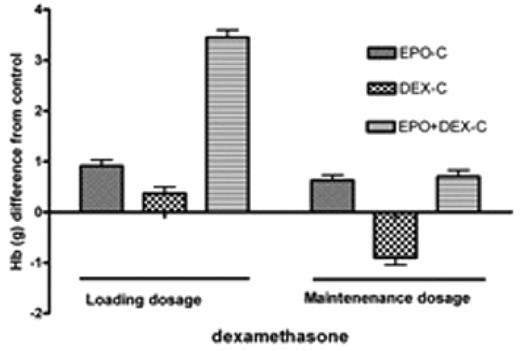Abstract
Glucocorticoids have either stimulatory or inhibitory effects on erythropoesis depending upon the timing and the dosage of their administration. We previously reported cases of enhanced hematopoetic recovery in response to erythropoietin (Epo; Procrit) in patients receiving prolonged treatment of glucocortcoids. To examine the differential roles of glucocorticoids on erythropoiesis in chronic settings, we use a murine model in current study and evaluate erythropoietic responses to Epo for rats receiving higher (loading) or lower (maintenance) dosages of dexamethasone(Dex) for a prolonged period of time. Commercially-obtained adult Sprague-Dawley rats were assigned randomly to DEX, EPO, DEX+EPO, or control groups, and maintained at conditions approved by the institutional Animal Care and Research Committee. Rats in the EPO or DEX+EPO groups received subcutaneous injection of Epo at 70 units/100 grams body weight, once a week, for five week. The animals in the DEX or DEX+EPO group were both divided into two subgroups receiving injection of Dex at either higher doses of 0.4mg/350 grams body weight, or lower doses of 0.02 mg/350 grams body weight, three times a week, for five weeks. The animals were sacrificed at the end of study and peripheral blood and bone marrow were used to evaluate levels of erythropoiesis. Weekly administration of Epo (70 units/100 grams body weight) for five weeks produced enhanced erythropoiesis in the EPO group, resulting in an increase of 10.6% in RBC, and 15.3% increase in hemoglobin (Hb), compared to control. Treatment of rats with higher dosage (0.4 mg/350 g, three times a week for five weeks) of dexamethasone increased RBC and Hb by 3% and 2%, respectively, when compared with controls. Combined treatment of Epo and dexamethasone at the higher dosage enhanced the erythropoiesis, and increased RBC and Hb by 20% and 23%, respectively. In contrast, treatment of rats with a lower maintenance dosage of 0.02 mg/350 g body weight, three times a week for five weeks, peripheral RBC and Hb levels were dropped by 7% and 6%, respectively. Combination of Epo and the lower dosage of dexamethasone could only generate an increase in RBC and Hb of 10% each, displaying suppressing effect of dexamethasone at lower dosage. Bone marrow biopsy revealed hypocellularity in all groups using dexamethasone. Marrow iron staining was performed and ruled out any iron deficiency in all groups. These results suggest that glucocorticoids modulate erythropoisis in two ways depending on concentrations, enhancing erythropoiesis greatly at loading dosage while suppressing it at lower maintenance doses. Our data, together with our clinical observations, present an interesting phenomenon of cross modulation of the two widely used medications, Epo and glucocorticoids. It certainly warrants further investigation of involving pathways at molecular levels.
In Vivo Effects of Dexamethasone on Epo stimulated erythropoiesis
In Vivo Effects of Dexamethasone on Epo stimulated erythropoiesis
Author notes
Disclosure: No relevant conflicts of interest to declare.


